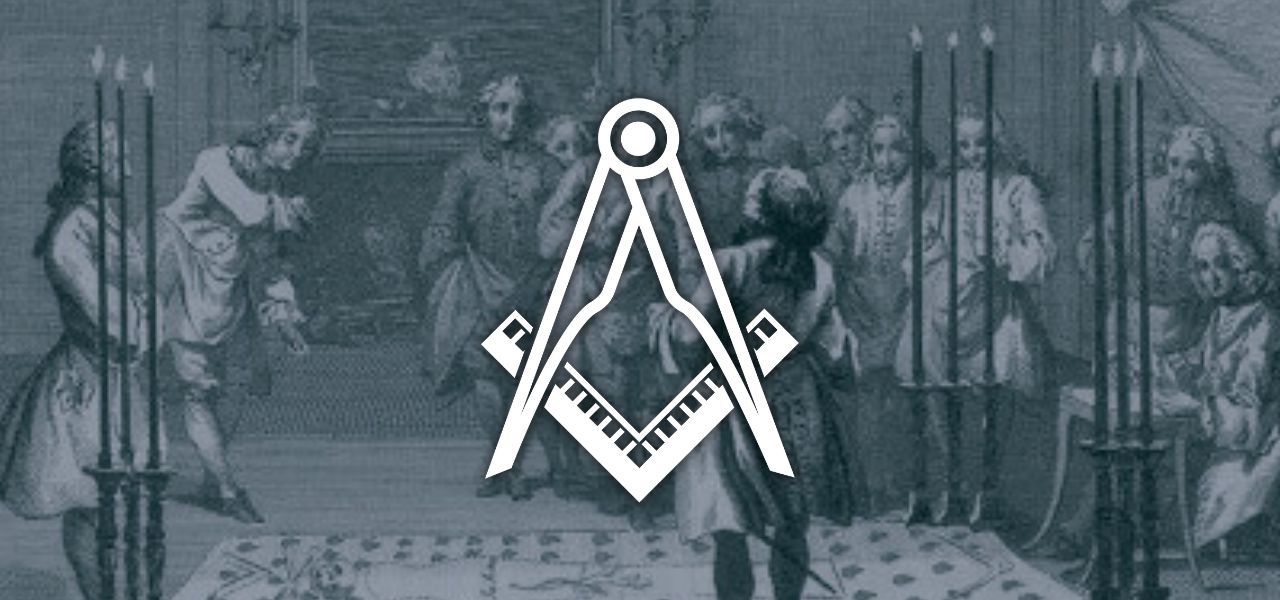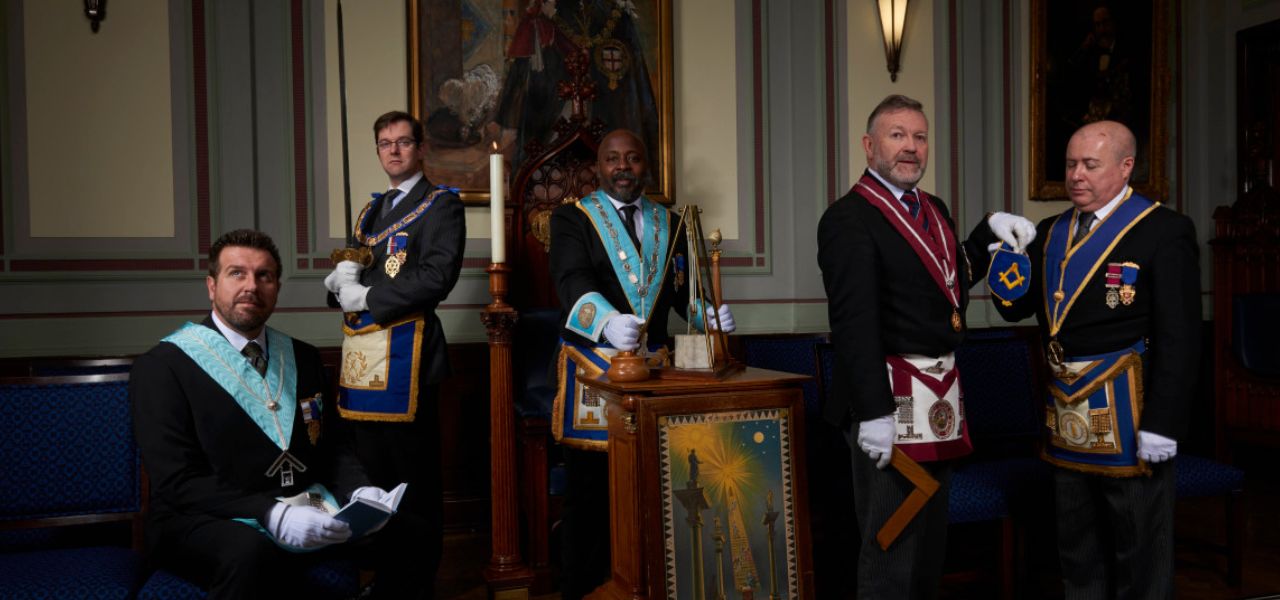Joining the Freemasons is an exciting journey that begins with curiosity and culminates in a lifelong brotherhood.
Many wonder about the exact moment they officially become a Freemason.
A person becomes a Freemason after completing the initiation ceremony known as the First Degree or Entered Apprentice degree.
The path to becoming a Freemason typically starts when an interested individual contacts a local lodge.
Candidates must meet certain requirements, including being male, of legal age (usually 18 or 21), and believing in a higher power. Good moral character is also essential, as lodges often conduct background checks.
Aspiring Freemasons should be prepared for a gradual process. Lodges carefully evaluate potential members, and it may take some time before receiving an invitation to join.
Patience is key, as Freemasonry values thoughtful consideration in all aspects of membership.

Becoming a Freemason
Joining Freemasonry involves several steps, from understanding the organization to completing initiation rituals.
Prospective members must meet specific criteria and undergo a formal process to join this centuries-old fraternal order.
Understanding Freemasonry
Freemasonry is a fraternal organization focused on personal growth, moral development, and community service.
Its members believe in a Supreme Being and teach moral lessons through symbols and allegories.
The organization has a rich history dating back centuries and maintains traditions while adapting to modern times.
Lodges serve as local meeting places where members gather regularly. Freemasonry emphasizes brotherhood, charity, and self-improvement. Members are expected to uphold high ethical standards and contribute positively to society.
Before pursuing membership, it’s crucial to research and understand Freemasonry’s principles and expectations.
This knowledge helps potential candidates decide if the organization aligns with their values and goals.
Meeting the Criteria
To become a Freemason, candidates must meet specific requirements.
These criteria ensure that new members align with the organization’s values and principles.
Key requirements include:
- Being a man of legal age (usually 18 or 21)
- Believing in a Supreme Being
- Having good moral character
- Being of sound mind and body
- Being able to support oneself and family
Most lodges conduct background checks and may not accept individuals with felony convictions.
Specific requirements can vary slightly between jurisdictions, so it’s essential to check with local lodges for precise details.
The Inquiry Process
Initiating the journey to become a Freemason typically begins with expressing interest to a current member or contacting a local lodge directly.
This step is often referred to as “inquiring” or “knocking at the door.”
The process usually involves:
- Reaching out to a lodge or Freemason
- Attending informational meetings or open houses
- Getting to know current members
- Submitting a formal application
Lodges may assign a mentor to guide prospective members through the process.
This mentor can answer questions and provide insights into Freemasonry.
Candidates should be prepared to discuss their reasons for wanting to join and demonstrate their understanding of Masonic principles.
Honesty and sincerity are highly valued during this process.
NB: If you’re just getting started in Freemasonry, and you’re serious about making the most of it, you can pair up with a mentor inside the Freemasons Community.
Attending Lodge Meetings
After expressing interest and meeting initial requirements, prospective members are often invited to attend public events or open house meetings at the lodge.
These gatherings provide an opportunity to learn more about Freemasonry and meet current members.
During these visits, candidates can:
- Observe lodge activities.
- Ask questions about Masonic traditions.
- Get a feel for the lodge’s atmosphere.
- Interact with members of the Lodge.
It’s important to dress appropriately and show respect for the lodge and its members during these visits.
These interactions help both the candidate and the lodge members decide if there’s a good fit.
Going Through Degrees
Once accepted, new members progress through the three main degrees: Entered Apprentice, Fellow Craft, and Master Mason.
Each degree involves a ceremony and teaches specific lessons and values.
The degree process typically includes:
- Memorizing and reciting certain passages
- Participating in symbolic rituals
- Learning Masonic history and philosophy
- Demonstrating understanding of Masonic principles
Progressing through degrees can take several months to a year or more, depending on the candidate’s dedication and the lodge’s schedule.
Each degree deepens the member’s understanding of Freemasonry and their role within the fraternity.
After completing the Master Mason degree, members are considered full Freemasons and can participate in all lodge activities and rituals.

After Initiation
Becoming a Freemason marks the beginning of a lifelong journey.
New initiates embark on a path of self-improvement, brotherhood, and community service that extends far beyond the initial ceremony.
Masonic Learning
New Masons should dive into studying Masonic principles and symbolism.
They attend regular lodge meetings where they participate in rituals and discussions about Masonic philosophy.
Mentors often guide new members, helping them understand the deeper meanings behind Masonic traditions.
This learning process is ongoing and can take years to fully grasp.
Many lodges offer educational programs and workshops to help Masons continue their growth. Topics may include history, ethics, and leadership skills.
Community Involvement
Freemasonry strongly emphasizes charity and community service. New members are encouraged to participate in lodge-organized events and volunteer activities.
These may include:
- Fundraising for local charities
- Volunteering at hospitals or schools
- Supporting youth organizations
By engaging in these activities, Masons put their values into practice and make a positive impact in their communities.
Ongoing Commitments
Becoming a Freemason involves several ongoing commitments:
- Regular lodge attendance
- Payment of dues
- Upholding Masonic principles in daily life
Members are expected to continue their personal growth and maintain high moral standards. This includes treating others with respect and practicing tolerance.
Freemasons also commit to supporting their fellow members. This brotherhood extends beyond lodge meetings, with Masons often forming lifelong friendships and professional networks.
Frequently Asked Questions
Joining Freemasonry involves specific requirements, procedures, and commitments. Let’s explore some common queries about becoming a Freemason.
What are the requirements for becoming a Freemason?
To join Freemasonry, you must be a male of at least 18 years old. Belief in a Supreme Being is essential. Good character and reputation are also crucial. Two existing members of the lodge you wish to join must recommend you.
How does one start the process of joining a Freemason Lodge?
The journey begins by submitting a petition for membership to a Masonic lodge in your area. Reach out to a local lodge or contact a Freemason you know to express your interest in joining (ASK12BE1).
What is the minimum age to join the Freemasonry fraternity?
The minimum age for joining Freemasonry is typically 18 years old. However, this may vary in some jurisdictions, with some requiring candidates to be up to 21 years of age.
Are there any fees or dues required for Freemason membership?
Yes, Freemasonry does involve financial commitments. Members pay initiation fees and annual dues. These costs help maintain the lodge and support various charitable activities.
What does the journey entail from initiation to becoming a full Mason?
The path to becoming a Master Mason involves completing three degrees. Depending on the individual and the lodge, this process can take several months or longer.
Where can I find a Masonic Lodge near me to begin my Masonic journey?
To find a lodge near you, visit the official website of your country’s Grand Lodge. They often provide lodge locators or contact information to help you connect with a local Masonic community.
You’re eager to begin your Masonic journey, but where do you start?
Our members-only Freemasons’ Community is your answer.
This isn’t just another group; it’s a dedicated space where you’ll receive expert guidance, connect with supportive brothers, and access exclusive resources to help you every step of the way.
If you’re serious about becoming a Freemason, join us today and take the first step with confidence.